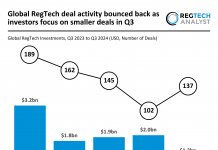London-based Tessian, which is using machine learning to transform email security, has raised $13m in fresh funding.
The Series A round was led by Balderton Capital with participation from existing investors, Accel. Amadeus Capital Partners, Crane, LocalGlobe, Winton Ventures and Walking Ventures also took part in the round. As part of the investment, Balderton partner Suranga Chandratillake and Accel Partner Luciana Lixandru have joined the board.
Tessian’s mission is to automatically protect individuals and enterprises from cybersecurity threats, keeping the world’s most sensitive data and systems private and secure.
Misaddressed emails are currently the number one data security incident reported to the Information Commissioner’s Office (ICO).In addition, GDPR has now made it mandatory for organisations to report such breaches involving personal information to the ICO, with the resulting fines as high as 4 percent of global turnover for the worst data breaches.
The machine intelligent email security platform automatically prevents security threats like misaddressed emails, data loss and non-compliance. Its technology analyses enterprise email networks to understand normal and abnormal email sending patterns and behaviours. The startup then detects anomalies in outgoing emails and warns users about potential mistakes, before the email is sent.
“With the recent report from the ICO that misaddressed emails are now the number one data security incident reported to them and GDPR now in full swing, companies should make addressing this risk a top security priority,” said Tim Sadler, CEO and co-founder of Tessian (formerly Checkrecipient). “It’s human nature to fear scary things like hackers or malware, but we often don’t think twice about the dangers behind something as familiar and ingrained as sending an email. In reality that’s where an overwhelming threat lies.”
Tessian’s founders, Tom Adams, Ed Bishop and Tim Sadler, met as engineering students at Imperial College. After starting their careers in investment banking the trio saw saw a gap in the market to protect companies against the problem of highly sensitive information being sent to the wrong person on email.
Unlike legacy rule-based technologies, Tessian requires no admin from security teams and no end-user behaviour change. It claims its platform can be deployed in under an hour and provides immediate historical reports that show how many misaddressed emails an organisation has sent prior to the installation date.
Copyright © 2018 RegTech Analyst
Copyright © 2018 RegTech Analyst






